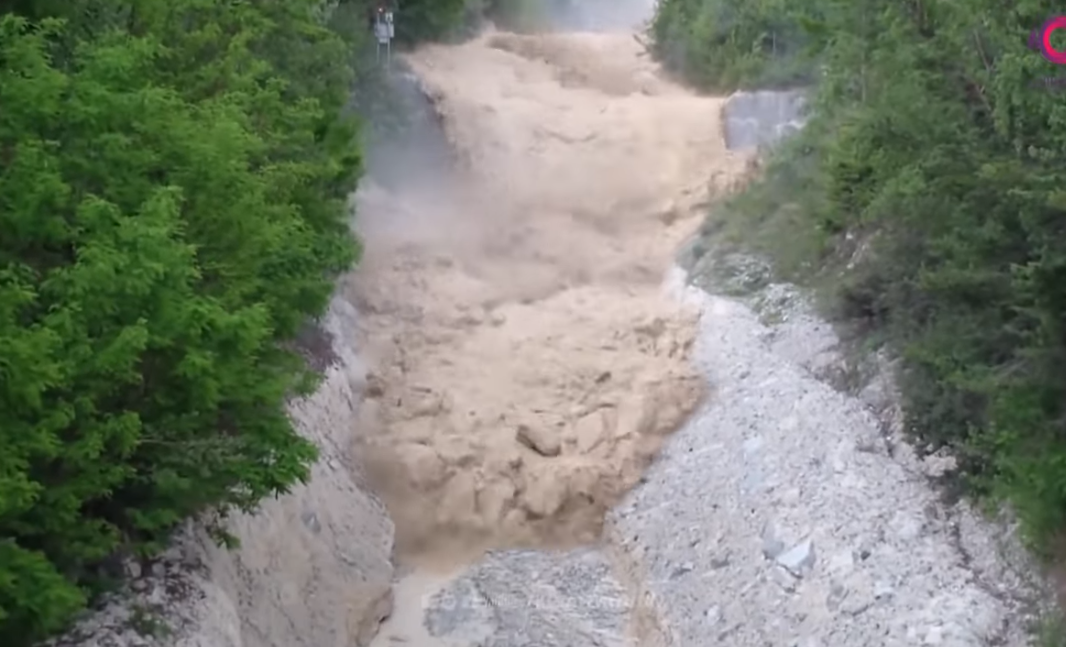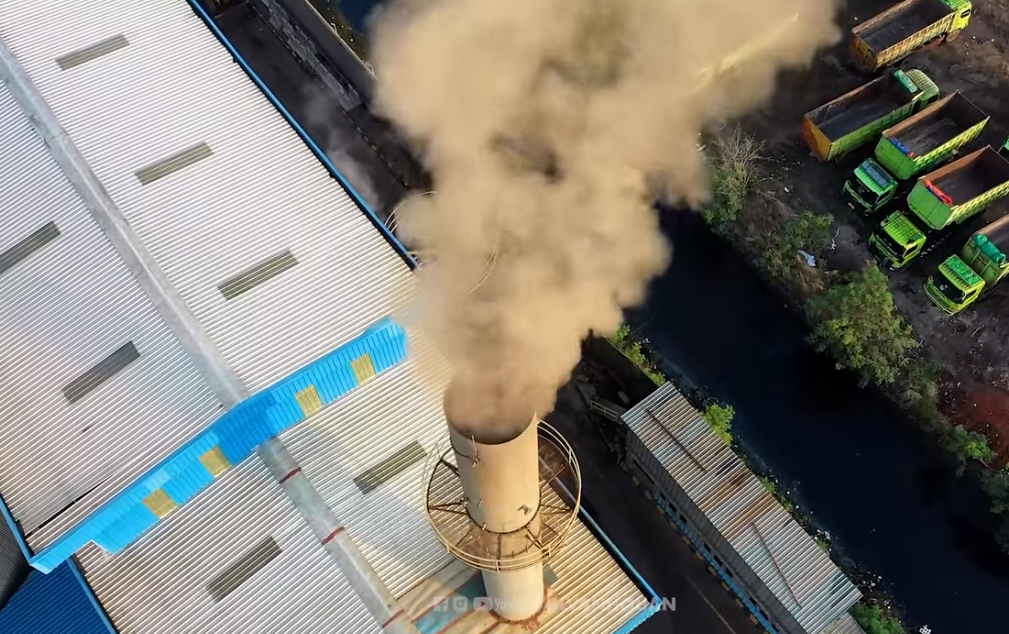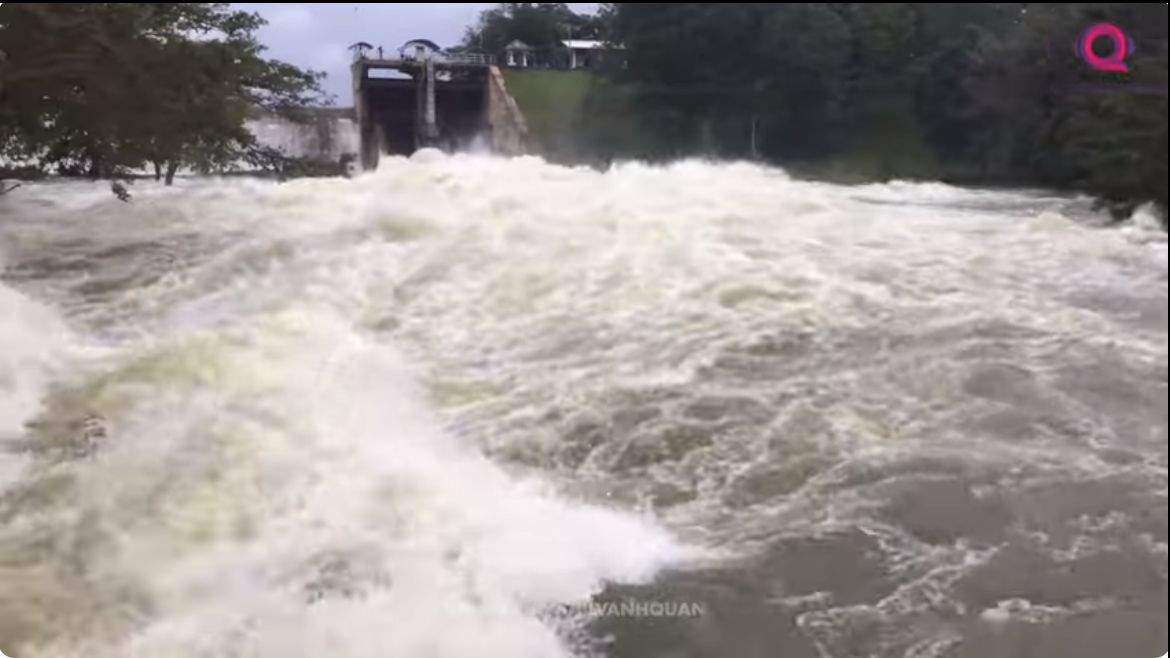Natural disasters caused
On September 10, 2023, a storm named Daniel from the Mediterranean Sea landed in North Africa, Libya. Its focal point was the city in the north of this country, causing two large dams on the city's side to burst, resulting in thousands of tons of water pouring down like a waterfall, sweeping away not only houses but also thousands of people into the sea. The Libyan Red Crescent organization further reported that 10,100 people were reported missing in the disaster, equivalent to 10% of the population of the city of Tenda. A terrifying number.
According to official United Nations figures released on September 16, the death toll from the flood disaster in the city of Tenda has risen to 11,300 people, with over 40,000 people in Libya losing their homes, property, and being left homeless overnight. Over 3,000 bodies have been buried by morning while another 2,000 bodies are still being processed. Rescue teams are still inspecting buildings in the city center while a diving team is surveying the offshore area of Tenda to search for victims.
In the past 10 years, Storm Daniel has been the most devastating natural disaster. However, it is not only Libya that has to bear the consequences of Mother Nature's wrath. In 2023, a series of natural disasters have been recorded across all continents. In mid-July, an unusual heavy rain in North Chungcheong Province, South Korea, caused 33 deaths, including 7 people who died trapped in a flooded car tunnel. In August 2023, a flood in Ha Bac Province claimed 78 lives according to Xinhua News, Ha Bac Province is expected to take up to 2 years to recover from the historic flood. The economic damage in the area is estimated at 95.8 billion yuan, equivalent to about 13.3 billion dollars.

In the Middle East on February 6, 2023, a devastating earthquake measuring 7.8 on the Richter scale struck at the southern border of Turkey and the northern region of Syria. Its aftermath claimed the lives of about 50,000 people, with 87 injured and millions forced into homelessness in harsh winter weather. In Vietnam alone, in the first 6 months of 2023, there were 1072 natural disasters of all kinds, except for tsunamis. In addition to the usual tropical storms, this year has seen a significant increase in landslides in mountainous areas.
On June 29, 2023, three high-rise buildings in Da Lat City collapsed and fell on a slope, resulting in two immediate deaths, buried alive, 5 others injured and rushed to the emergency hospital. A group of workers was urgently mobilized to prevent the landslide from spreading. Then on July 30, 2023, on National Highway 20 at Bao Loc Pass, a serious landslide occurred burying 4 people at a nearby traffic police station and causing their deaths. The incident also caused a bus carrying dozens of students to swerve off the road, luckily the bus had no casualties.

The main cause of these landslides is heavy rain over many days in mountainous areas, where the land is no longer firmly held due to human intervention, making it prone to landslides and dangerous. Storms are always disasters that cause great damage, but heatwaves pose another risk as high temperatures do not immediately kill people like storms do. However, it makes life much more difficult.
One of the hardest-hit areas is China, which is now experiencing heatwaves 50 times faster than before. Every 5 years, people in China have to endure terrifying heatwaves over 40 degrees, causing the deaths of many people in the summer.
In July 2023, temperatures above 45 degrees Celsius are common in the southern regions of Europe, in many places in the United States and Mexico, heatwaves in Europe are 2.5 degrees Celsius hotter, in North America it is 2 degrees. Temperature records are constantly being broken each year, raising serious concerns for human health, especially for vulnerable groups such as children and the elderly. However, the consequences of natural disasters do not stop there, countries must also address a host of humanitarian issues, flood victims will have to face polluted living environments, an increased risk of cholera due to the flood contaminating water sources.

Victims of earthquakes also face similar situations where their homes are destroyed, making sanitation and access to food close together, leading to digestive diseases. Furthermore, in winter weather, pneumonia can occur from exposure to the elements. The World Meteorological Organization (WMO) issues a very alarming warning about climate change, stating that the number of natural disasters has increased fivefold in the past half-century, causing seven times more damage than in 1970. The intensity of natural disasters has increased from abnormal heatwaves, floods, droughts to super typhoons around the world.
Faced with frequent natural disasters, one wonders: Why are they occurring more and more?
In the past, coastal areas like Vietnam were prone to disasters because all storms are formed offshore and move inland. Therefore, coastal areas become the first line of defense before these storms weaken and move further inland. In addition, high mountainous areas with steep slopes in many places over 10 degrees create favorable conditions for erosion, rapid water accumulation leading to flash floods, causing significant damage to life and especially human lives. However, not all causes are due to natural disasters.
Today, the world's population is increasing, while the land area for living is not expanding. Therefore, as the land becomes more crowded, people become more numerous. Thus, excessive resource exploitation activities have generated a huge amount of emissions into nature, and these emissions have caused the Earth's temperature to rise over decades, leading to climate change.
Climate change is the cause of a series of severe consequences.
- \n
- First, increasing temperatures over time are changing weather patterns and disrupting the normal balance of nature. They cause increasingly intense storms occurring more frequently, heavy rains leading to floods and landslides. \n
- Second, rising temperatures cause increasingly severe heatwaves, with extreme levels, heatwaves leading to droughts causing severe damage to agriculture, livestock, threatening global food security. \n
- Third, floods and droughts are ideal conditions for the strong development of various parasites, intermediate hosts transmitting dangerous diseases such as flies and mosquitoes. Rising temperatures cause polar ice to melt rapidly. In addition to causing sea levels to rise and flooding in cities, it also releases prehistoric bacteria from ice layers, which is the reason why many dangerous diseases without cure are emerging today. \n

Humans exploit resources excessively, causing nature to become unbalanced, generating waste emissions that pollute the environment, causing climate change, and the result is that Mother Nature has returned to us extremely terrible consequences. More frequent natural disasters and increasingly severe damage both materially and to human lives. This is in line with the Buddhist concept of karma in life when sowing a seed, it will emit an energy and the universe will send back a different energy to humans. We send good energy, we will receive good things, send bad energy, of course, we will receive bad things.
How we treat nature will determine the similar consequences we will have to face. Moreover, the cycle of life always has 4 stages: Establishment, Prosperity, Decline, and Destruction. These are the 4 stages of formation, development to the peak, then decline and destruction, it is similar to every dynasty in human history as well as every social form from ancient times to the present. Nothing exists immutable and forever, everything has a birth and a death. In the final stages when humans often engage in combat such as selfishness causing destructive wars against nature, they are also approaching the preventive stage. At this point, we have to bear the karma we have created, this karma is not for each individual but for an entire community, nation, and all of humanity.
Changing this is not easy, but economic benefits often go against environmental benefits. To continue to develop and progress, sacrifices must be made to nature to varying degrees. However, change is not entirely impossible, world leaders must find a way to reduce the economic ambitions of nations to restore some balance and sustainability of the natural environment as before.
We have made efforts through treaties, non-governmental organizations actively, but that is still not enough, let's slow down a bit and look back at our entire green planet before humans appeared, it was once beautiful and peaceful. If we do not protect the Earth, it also means that we are destroying our own lives. If we want natural disasters to occur less frequently and less extreme, then we must start changing from the thoughts of each individual.
